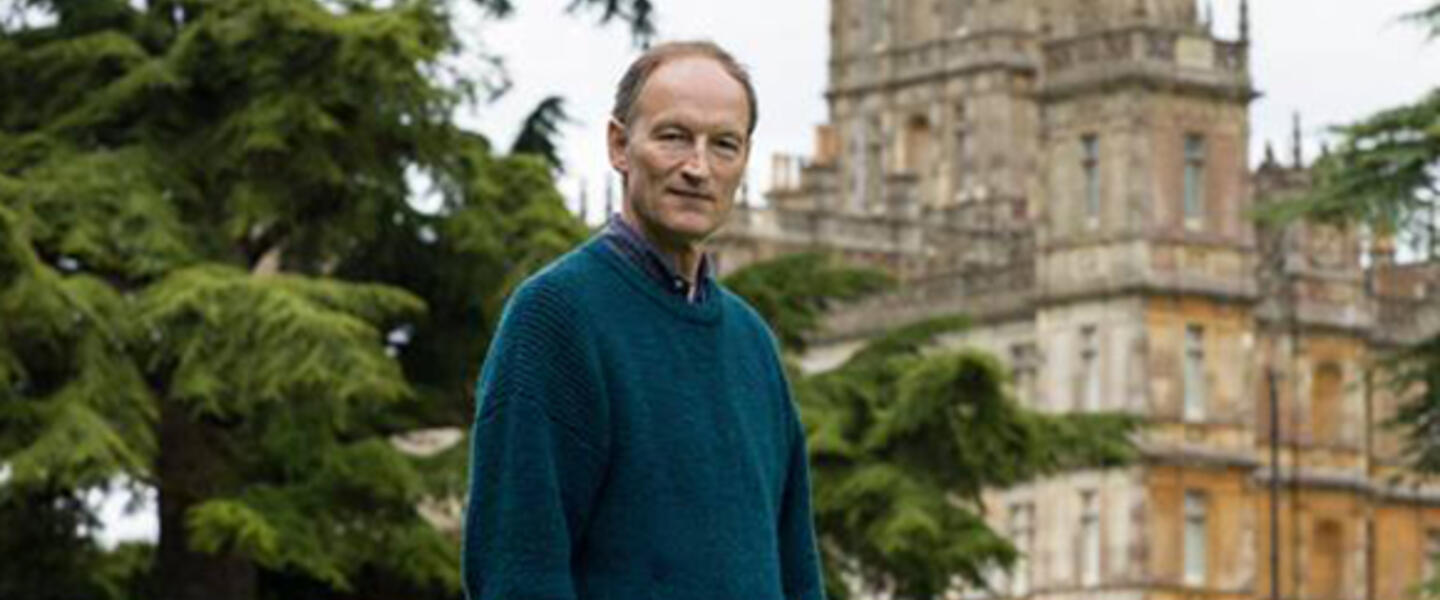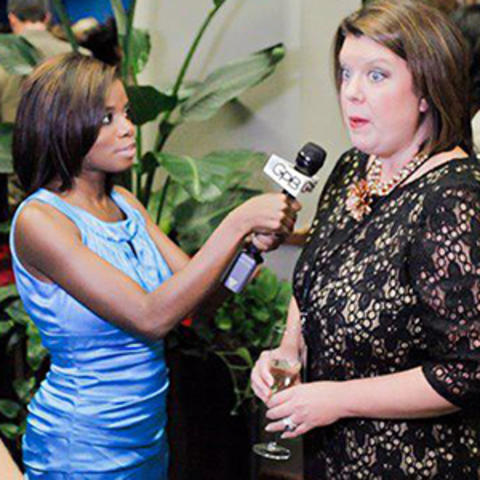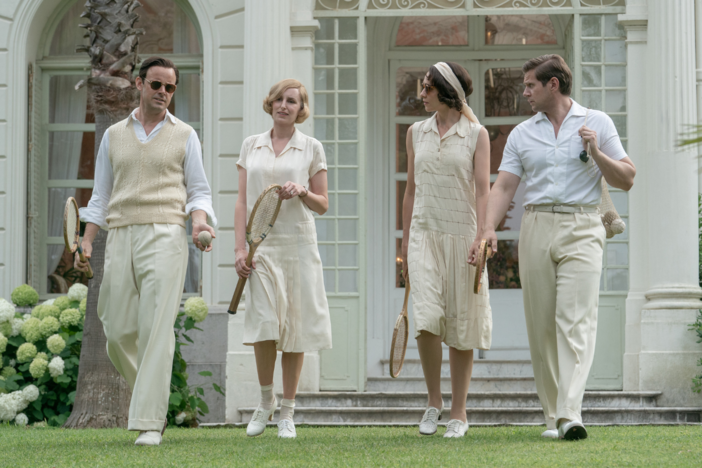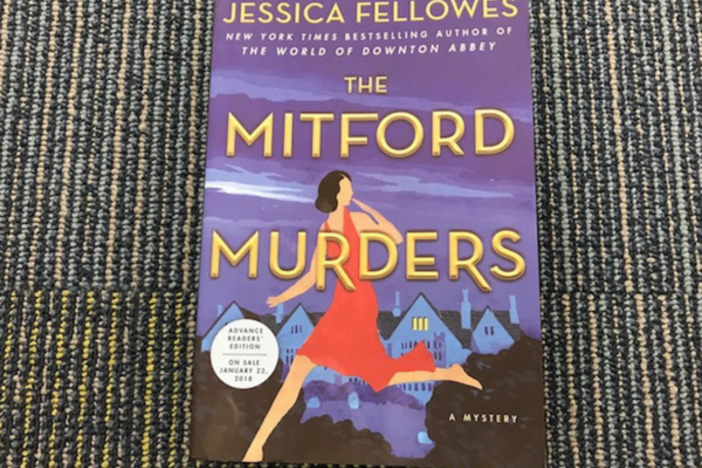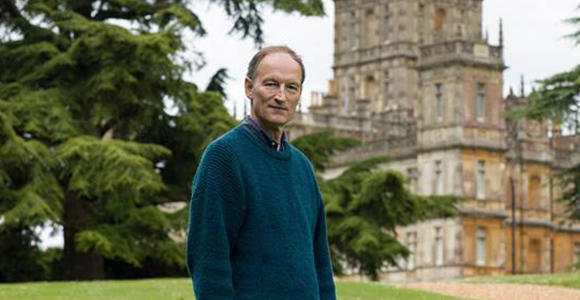
Section Branding
Header Content
Alastair Bruce, Downton Abbey's "Mr. Manners", Answers Your Questions Part 1
Primary Content

Thanks to Alastair Bruce, my New Year's resolution is to sit up straighter. That is the effect the historical advisor for "Downton Abbey" has on people.
Bruce finally gets his due in the "The Manners of Downton Abbey", a special that airs after the season five premiere of the show Sunday, January 4 at 11 p.m.
In the special, he reveals how he keeps the production authentic to the British period the show is about.
Sitting as straight as an arrow was one of the cultural “do's” that early 20th century Brits and Americans for that matter adhered to. Because of that, people had less back problems back then, Bruce explained to me when he visited for our “Downton” gala earlier this month.
Back problems and why you should write to the Academy to request that they add a historical advisor category to the Oscars are some of the subjects that came up when I asked him the questions you provided in response to the “Help Me Interview Downton Abbey Historical Advisor Alastair Bruce” post.
His responses appear below in part one of this post. Next week, I’ll post the rest of it.
*Correction on when the show airs: Listen to “Two Way Street” January 10 to hear Bill Nigut’s interview with Bruce. “The Oracle” talked about his impressive Scottish heritage and relationship with the royal familt. It’s a must listen to.
Desperate for Downton: (From Co-Blogger Rachel Buchman) How did you arrive at being the historical advisor to a number of films and “Downton Abbey”?
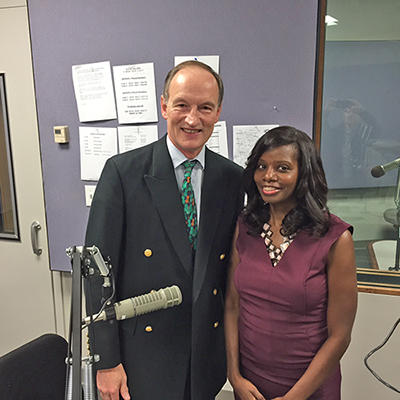
Alastair Bruce: Well, a great friend of mine married Julian Fellowes who is the most remarkable writer and he started with an adaptation of Mark Twain’s “Prince and the Pauper”. And I am an expert on English coronation ritual and found myself being quite convenient because in that story a King of England called Edward the VI swaps places with a pauper and so I helped them set that coronation.
I think Julian thought I could do it quite well and then when he wrote a wonderful film all about Queen Victoria, I got involved with that. He’d already done “Gosford Park” which had lots of detail in it which I was perhaps able to help him with. And then I went off and did the “King’s Speech” which is a film about King George VI. And he was the Queen’s father and he had a bit of a difficulty giving public speeches.
And finally I came on to “Downton Abbey“ and I’ve done that now for five years and we’re about to start the sixth. So that’s really my way in. Many people write to me saying ‘how can I do your job and how do you do it?’ I wasn’t somebody who applied for a job that was there.
What makes me sad coming into America is that there is no prize in the Emmys for historical advisors. Otherwise I think I’d be a good candidate for them. They give them for everything else and the Oscars don’t have prizes for historical advisors so if anyone out there can encourage the academy to give one, I might end up with something on my mantel piece.
Desperate for Downton: Well you know what - I can put that in the blog...
Bruce:... Could you and see what happens? Because I think – I really do think it makes a difference to a story if you don’t just deliver the narrative for people’s conscience. But you give their subconscious a sense of reassurance by transporting them legitimately into time by getting all of the detail right and I think people notice that – something deep down in them tells them whether they are being correctly transported in time to a period that is to all intents and purposes right and that I think is a contributory factor to the delivery of good entertainment which I think at the moment is not recognized.
Desperate for Downton: And that also makes people feel like they’re smarter – that they are taking part in something that is boosting their intelligence as opposed to empty entertainment.
Bruce: Well all entertainment is what we’re trying to create and “Downton Abbey” must be entertainment first. It’s not a historical documentary. Although I try to put structure in the background which is correct. But it is entertainment. But the moment we stop entertaining we will lose our audience and people want to have a time when they turn that television on for whatever it is they like to watch and just be entertained. If they walk away with a greater interest in the period that I have the privilege of helping to recreate – if they want to find out more about history - if they want to find out more about the people who are referred to, who are great elements of that story - I’m delighted because I’ve always found further inquiry to be the route for which I have gained the better appreciation of the world I’m in.
Desperate for Downton: (Fan Question) How has past experiences with real life royals, prepared you for this role?
Bruce: Well the royal family are carrying out a function that is almost identical to that which was carried out by King George V and Queen Mary – that is acting as the head of state and with the family supporting that structure and uniquely being able therefore to give the people of the United Kingdom and of the other countries of which the Queen is head of state like Australia, New Zealand, Canada and so on and so forth a chance to touch the effect of the head of the state and I think that in itself is quite fascinating.
So working with Prince Edward as his equerry, I have seen how that works – and I have seen the manner of which with his decorum and his poise you get a sense of what it is for Lord Grantham to be in his position of seniority. And how he is delivering his role as the head of his community; he is the head of state as it were within his community.
I think that’s been a great benefit. And on the occasions when I have had the pleasure and privilege of being entertained by members of the royal family, I’ve seen how beautifully their staff delivered the performance of that entertainment. And it reminds me again of elements of court history which I have studied where you see how the people who worked for the King and Queen, have delivered perfection and that’s what the aristocracy were trying to do. And they wanted their footman to put on this paradelike performance for dinner . And you know if you were a tall footman you got paid more because you looked better and that was the way people got compensated. And you might regard that as horrific but it was important to big houses that they had wonderful looking people in those days – doing this sort of front of house job.
And it mattered for these big houses that they put on the very best performance they could.
Desperate for Downton: So is that why in one of these videos that ITV put out…
Bruce: That’s a very big answer...
Desperate for Downton: No – no sure it dovetails into the next question I have about some of the videos that PBS and ITV have put out – about some of the background that goes on that we talked about – Ed Speelers – he said that you told him he has to be a peacock to play his role so is that why getting back to what you were saying about the royals – they wanted to show the most beautiful people and show perfection. Is that why the footman had to be the like peacock of the group?
Bruce: A house was judged by how charming its hosts were, of course - but by how brilliantly it laid on its role as entertainment area too. And I think that Ed was the most wonderful actor to work with because he’d never done anything like this before and he arrived with how should I put it? A young man’s gait. He walked with that sway, that confidence, that coolness, that he must be hugely admired for and much loved for by many people. But it was entirely wrong for the period.
Desperate for Downton: Really?
Bruce: So I made sure that he walked, as a soldier would, to learn the centering of his body. To learn how to hold his head, absolutely center. And to walk in a straight line in a way that young men very often don’t. They honestly don’t walk in a straight line unless they‘ve had too much to drink! But I just think people now are much more – you know “hey” – you know they talk about (how) their trousers are hanging around their bottom and stuff – and you know it’s a very different world. You know people don’t wear leather shoes now.
And the footman had been brought up in leather shoes and they make you walk differently, whether you realize it or not. I mean we have terrible trouble, I don’t know about the United States Army but the British Army bringing young men into the British Army and putting them into leather boots and their feet can’t hack it cause they’re not used to it. They’ve been wearing trainers all this time.
And it just shows you that time changes so many subtle things that you don’t realize and yet I have to try and haul people back and force them into you know clothing that Ed would never dream of wearing for an evening out: an absolutely stiff boiled shirt with a high collar that sticks right into your lower chin. I mean it’s not a comfortable thing and it makes you sit upright. When you watch them relaxing and doing their (dialogue) they’re all absolutely bolt upright because they can’t do anything else.
Desperate for Downton: So is that also why Michelle Dockery said – in one scene she asked if she could lean over a little bit , but you said no grandma’s coming into the room. So was there a different protocol if parents came into the room?
Bruce: You know she’s created a beautiful comprehension of what was very clear and that is that I just don’t let them lean down because they didn’t; they sat up straight.
Desperate for Downton: All the time?
Bruce: Yeah. And so should you! And you’d probably find that you’re back would be in a better state and it probably is now, maybe you have a very strong back. But a lot of people have trouble with their backs now. They didn’t have trouble with their backs in the same way back then and it’s only about 50 years ago and people spend millions going off to see their doctors. If they sat up straight, they wouldn’t have a problem. But they don’t – they just all lean back and slouch and do that and that’s fine but – there are effects. There are results to those effects and there are consequences to things like that.
But I just think that if people knew that poise was very much about how they were understood by other people and I think that if you walk into a room and you are bolt upright and your shoulders are back - I find particularly with women because women I think are so much more granted the opportunity to mesmerize – men are too of course but if everyone is doing this with their computers leaning forward and their shoulders – everyone’s shoulders are all coming forward; you look at men and women of the 1920s, be they Americans or British and I tell you because they weren’t constantly on their computers – their shoulders are further back and if you put your shoulders further back - if you put your neck further back, I promise you, every man is more handsome and every woman is more beautiful.
Desperate for Downton: It’s all about presentation and that’s the best presentation.
Bruce: Yeah, indeed.
Return next week for part 2 of this interview and remember to watch the premiere episode of "Downton Abbey" Sunday, January 4 at 9 p.m. and "The Manners of "Downton Abbey" follows at 11 p.m.
